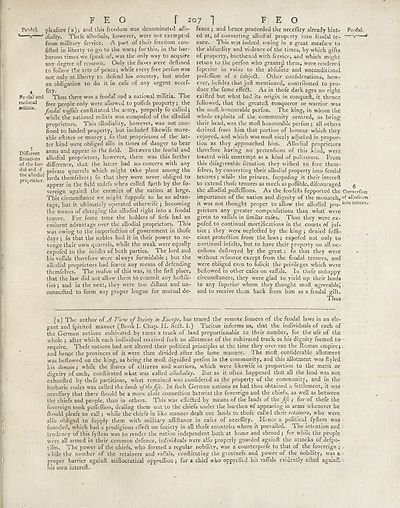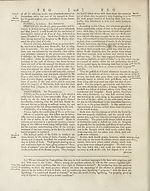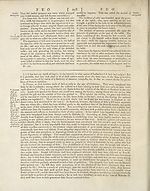Encyclopaedia Britannica > Volume 7, ETM-GOA
(229) Page 207
Download files
Complete book:
Individual page:
Thumbnail gallery: Grid view | List view

F E O I 207 *| F E O
Fenflat. pleafure (b); and this fieedom was denominated al!o-
^ v 1 dtality. Thefe allodials, however, were not exempted
from military fervice. A part of their freedom con-
fifted in liberty to go to the wars; for this, in the bar¬
barous times we fpeak of, was the only way to acquire
any degree of renown. Only the Haves were deftined
to follow the arts of peace; while every free perfon was
not only at liberty to defend his country, but under
an obligation to do it in cafe of any urgent necef-
4 fity.
Feodal and Thus there was a feodal and a national militia. The
national free pe0ple only were allowed to polfefs property; the
militia. feu(lal vaJfah conftituted the army, properly fo called;
while the national militia was compofed of the allodial
proprietors. This allodiality, however, was not con¬
fined to landed property, but included likewife move-
able eftates or money ; fo that proprietors of the lat¬
ter kind were obliged alfo in times of danger to bear
Different arms and a?Pear in the field- Between the feodal and
fituations allodial proprietors, however, there was this farther
of the feo- difference, that the latter had no concern with any
dal and of prjvate quarrels which might take place among the
^a"°d‘al lords themfelves ; fo that they were never obliged to
P ^ ' appear in the field unlefs when called forth by the fo-
vereign againfl: the enemies of the nation at large.
This circumftance we might fuppofe to be an advan¬
tage, but it ultimately operated otherwife ; becoming
the means of changing the allodial right into a feodal
tenure. For fome time the holders of fiefs had an
eminent advantage over the allodial proprietors. This
was owing to the imperfection of government in thofe
days ; f© that the nobles had it in their power to re¬
venge their own quarrels, while the weak were equally
expofed to the infults of both parties. The lord and
his vaffals therefore were always formidable ; but the
allodial proprietors had fcarce any means of defending
themfelves. The reafon of this was, in the firft place,
that the law did not allow-them to commit any hoftili-
ties; and in the next, they were too diftant and un¬
connected to form any proper league for mutual de¬
fence ; and hence proceeded the neceffity already hint- Feodal.
ed at, of converting allodial property into feudal te- v—
nure. This was indeed owing in a great meafure to
the abfurdity and violence of the times, by which gifts
of property, burthened with fervice, and which might
return to the perfon who granted them, were rendered
fuptrior in value to the abfolute and unconditional
poifeifion of a fubjeCt. Other confiderations, how¬
ever, befides that juft mentioned, contributed to pro¬
duce the fame effeCt. As in thofe dark ages no right
exifted but what had its origin in conqueft, it thence
followed, that the greateft conqueror or warrior was
the moft honourable perfon. The king, in whom the
whole exploits of the community centred, as being
their head, was the moft honourable perfon ; all others
derived from him that portion of honour which they
enjoyed, and which was moft nicely adjufted in propor¬
tion as they approached him. Allodial proprietors
therefore having no pretenfions of this kind, were
treated with contempt as a kind of poltroons. From
this difagreeable fituation they vviihed to free them-
felves, by converting their allodial property into feudal
tenures ; while the princes, fuppofing it their intereft
to extend thofe tenures as much as poffible, difeouraged g
the allodial pofleffions. As the feodifts fupported the Converfion
importance of the nation and dignity of the monarch,of allodium
it was not thought proper to allow the allodial pro-iut0 tcnure'
prietors any greater compenfations than what were
given to vaflals in fimilar cafes. Thus they were ex¬
pofed to continual mortifications in the courts of juf-
tice; they were neglected by the king ; denied fuffi-
cient prote&ion from the laws; expofed not only to
continual infults, but to have their property on all oc-
cafions deftroyed by the great: fo that they were
without refource except from the feodal tenures, and
were obliged even to folicit the privileges which were
heft owed in other cafes on vaffals. In thefe unhappy
circumftances, they were glad to yield up their lands
to any fuperior whom they thought moft agreeable^,
and to receive them back from him as a feudal gift.
Thus
(b) The author of A View of Society in Europe, has traced the remote fources of the feodal laws in an ele¬
gant and fpirited manner (Book I. Chap. II. Seft. I.) Tacitus informs us, that the individuals of each of
the German nations cultivated by turns a track of land proportionable to their number, for the ufe of the
whole ; after which each individual received fuch an allotment of the cultivated track as his dignity feemed to -
require. Theft nations had not altered their political principles at the time they oyer-ran the Roman empire; -
and hence the provinces of it were then divided after the lame manner. The moft confiderable allotment
was bellowed on the king, as being the moft dignified perfon in the community, and this allotment was ftyled
his domain; while the lhares of citizens and warriors, which were likewife in proportion to the merit or
dignity of each, conftituted what was called allodiality. But as it often happened that all the land was not
exhaufted by thefe partitions, what remained was confidered as the property of the community, and in the
barbaric codes was called the lands of thefife. In fuch German nations as had thus obtained a fettlement, it was
neceffary that there fhould be a more clofe connexion betwixt the fovereign and the chiefs, as well as between
the chiefs and people, than in others. This was effe&ed by means of the lands of the fife ; for of thefe the .
fovereign took poffeffion, dealing them out to the chiefs under the burthen &f appearing in arms whenever he
Ihould pleafe to call; while the chiefs in like manner dealt out lands to thofe called their retainers, who were
alfo obliged to fupply them with military affiftance in cafes of necefiity. Hence a political fyftem was
founded, which had a prodigious effect on fociety in all thofe countries where it prevailed. The intention and
tendency of this fyilem was to render the nation independent both at home and abroad ; for while the people
were all armed in their common defence, individuals were alfo properly guarded againft the attacks of defpo-
tifm. .The power of the chiefs, who formed a regular nobility, was a counterpoife to that of the fovereign ; ,
v bile the number of the retainers and vaffals, conftituting the greatnefs and power of the nobility, was a
proper barrier againft ariftocratical oppreflion; for a chief who oppreffed his vaffals evidently adled againft:
his own intereft.
Fenflat. pleafure (b); and this fieedom was denominated al!o-
^ v 1 dtality. Thefe allodials, however, were not exempted
from military fervice. A part of their freedom con-
fifted in liberty to go to the wars; for this, in the bar¬
barous times we fpeak of, was the only way to acquire
any degree of renown. Only the Haves were deftined
to follow the arts of peace; while every free perfon was
not only at liberty to defend his country, but under
an obligation to do it in cafe of any urgent necef-
4 fity.
Feodal and Thus there was a feodal and a national militia. The
national free pe0ple only were allowed to polfefs property; the
militia. feu(lal vaJfah conftituted the army, properly fo called;
while the national militia was compofed of the allodial
proprietors. This allodiality, however, was not con¬
fined to landed property, but included likewife move-
able eftates or money ; fo that proprietors of the lat¬
ter kind were obliged alfo in times of danger to bear
Different arms and a?Pear in the field- Between the feodal and
fituations allodial proprietors, however, there was this farther
of the feo- difference, that the latter had no concern with any
dal and of prjvate quarrels which might take place among the
^a"°d‘al lords themfelves ; fo that they were never obliged to
P ^ ' appear in the field unlefs when called forth by the fo-
vereign againfl: the enemies of the nation at large.
This circumftance we might fuppofe to be an advan¬
tage, but it ultimately operated otherwife ; becoming
the means of changing the allodial right into a feodal
tenure. For fome time the holders of fiefs had an
eminent advantage over the allodial proprietors. This
was owing to the imperfection of government in thofe
days ; f© that the nobles had it in their power to re¬
venge their own quarrels, while the weak were equally
expofed to the infults of both parties. The lord and
his vaffals therefore were always formidable ; but the
allodial proprietors had fcarce any means of defending
themfelves. The reafon of this was, in the firft place,
that the law did not allow-them to commit any hoftili-
ties; and in the next, they were too diftant and un¬
connected to form any proper league for mutual de¬
fence ; and hence proceeded the neceffity already hint- Feodal.
ed at, of converting allodial property into feudal te- v—
nure. This was indeed owing in a great meafure to
the abfurdity and violence of the times, by which gifts
of property, burthened with fervice, and which might
return to the perfon who granted them, were rendered
fuptrior in value to the abfolute and unconditional
poifeifion of a fubjeCt. Other confiderations, how¬
ever, befides that juft mentioned, contributed to pro¬
duce the fame effeCt. As in thofe dark ages no right
exifted but what had its origin in conqueft, it thence
followed, that the greateft conqueror or warrior was
the moft honourable perfon. The king, in whom the
whole exploits of the community centred, as being
their head, was the moft honourable perfon ; all others
derived from him that portion of honour which they
enjoyed, and which was moft nicely adjufted in propor¬
tion as they approached him. Allodial proprietors
therefore having no pretenfions of this kind, were
treated with contempt as a kind of poltroons. From
this difagreeable fituation they vviihed to free them-
felves, by converting their allodial property into feudal
tenures ; while the princes, fuppofing it their intereft
to extend thofe tenures as much as poffible, difeouraged g
the allodial pofleffions. As the feodifts fupported the Converfion
importance of the nation and dignity of the monarch,of allodium
it was not thought proper to allow the allodial pro-iut0 tcnure'
prietors any greater compenfations than what were
given to vaflals in fimilar cafes. Thus they were ex¬
pofed to continual mortifications in the courts of juf-
tice; they were neglected by the king ; denied fuffi-
cient prote&ion from the laws; expofed not only to
continual infults, but to have their property on all oc-
cafions deftroyed by the great: fo that they were
without refource except from the feodal tenures, and
were obliged even to folicit the privileges which were
heft owed in other cafes on vaffals. In thefe unhappy
circumftances, they were glad to yield up their lands
to any fuperior whom they thought moft agreeable^,
and to receive them back from him as a feudal gift.
Thus
(b) The author of A View of Society in Europe, has traced the remote fources of the feodal laws in an ele¬
gant and fpirited manner (Book I. Chap. II. Seft. I.) Tacitus informs us, that the individuals of each of
the German nations cultivated by turns a track of land proportionable to their number, for the ufe of the
whole ; after which each individual received fuch an allotment of the cultivated track as his dignity feemed to -
require. Theft nations had not altered their political principles at the time they oyer-ran the Roman empire; -
and hence the provinces of it were then divided after the lame manner. The moft confiderable allotment
was bellowed on the king, as being the moft dignified perfon in the community, and this allotment was ftyled
his domain; while the lhares of citizens and warriors, which were likewife in proportion to the merit or
dignity of each, conftituted what was called allodiality. But as it often happened that all the land was not
exhaufted by thefe partitions, what remained was confidered as the property of the community, and in the
barbaric codes was called the lands of thefife. In fuch German nations as had thus obtained a fettlement, it was
neceffary that there fhould be a more clofe connexion betwixt the fovereign and the chiefs, as well as between
the chiefs and people, than in others. This was effe&ed by means of the lands of the fife ; for of thefe the .
fovereign took poffeffion, dealing them out to the chiefs under the burthen &f appearing in arms whenever he
Ihould pleafe to call; while the chiefs in like manner dealt out lands to thofe called their retainers, who were
alfo obliged to fupply them with military affiftance in cafes of necefiity. Hence a political fyftem was
founded, which had a prodigious effect on fociety in all thofe countries where it prevailed. The intention and
tendency of this fyilem was to render the nation independent both at home and abroad ; for while the people
were all armed in their common defence, individuals were alfo properly guarded againft the attacks of defpo-
tifm. .The power of the chiefs, who formed a regular nobility, was a counterpoife to that of the fovereign ; ,
v bile the number of the retainers and vaffals, conftituting the greatnefs and power of the nobility, was a
proper barrier againft ariftocratical oppreflion; for a chief who oppreffed his vaffals evidently adled againft:
his own intereft.
Set display mode to:
![]() Universal Viewer |
Universal Viewer | ![]() Mirador |
Large image | Transcription
Mirador |
Large image | Transcription
Images and transcriptions on this page, including medium image downloads, may be used under the Creative Commons Attribution 4.0 International Licence unless otherwise stated. ![]()
| Encyclopaedia Britannica > Encyclopaedia Britannica > Volume 7, ETM-GOA > (229) Page 207 |
|---|
| Permanent URL | https://digital.nls.uk/189124206 |
|---|
| Attribution and copyright: |
|
|---|
| Description | Ten editions of 'Encyclopaedia Britannica', issued from 1768-1903, in 231 volumes. Originally issued in 100 weekly parts (3 volumes) between 1768 and 1771 by publishers: Colin Macfarquhar and Andrew Bell (Edinburgh); editor: William Smellie: engraver: Andrew Bell. Expanded editions in the 19th century featured more volumes and contributions from leading experts in their fields. Managed and published in Edinburgh up to the 9th edition (25 volumes, from 1875-1889); the 10th edition (1902-1903) re-issued the 9th edition, with 11 supplementary volumes. |
|---|---|
| Additional NLS resources: |
|

